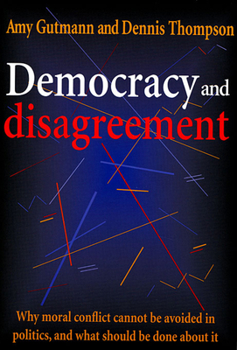Democracy and Disagreement
Select Format
Select Condition 
Book Overview
The din and deadlock of public life in America--where insults are traded, slogans proclaimed, and self-serving deals made and unmade--reveal the deep disagreement that pervades our democracy. The disagreement is not only political but also moral, as citizens and their representatives increasingly take extreme and intransigent positions. A better kind of public discussion is needed, and Amy Gutmann and Dennis Thompson provide an eloquent argument for "deliberative democracy" today. They develop a principled framework for opponents to come together on moral and political issues.
Gutmann and Thompson show how a deliberative democracy can address some of our most difficult controversies--from abortion and affirmative action to health care and welfare--and can allow diverse groups separated by class, race, religion, and gender to reason together. Their work goes beyond that of most political theorists and social scientists by exploring both the principles for reasonable argument and their application to actual cases. Not only do the authors suggest how deliberative democracy can work, they also show why improving our collective capacity for moral argument is better than referring all disagreements to procedural politics or judicial institutions. Democracy and Disagreement presents a compelling approach to how we might resolve some of our most trying moral disagreements and live with those that will inevitably persist, on terms that all of us can respect.Format:Paperback
Language:English
ISBN:0674197666
ISBN13:9780674197664
Release Date:January 1998
Publisher:Belknap Press
Length:432 Pages
Weight:1.30 lbs.
Dimensions:0.9" x 6.2" x 9.4"
Customer Reviews
1 rating
How can Democracy live with inner conflicts
Published by Thriftbooks.com User , 24 years ago
'Democeracy and disagreement' contributes a great deal to the current discussion in political philosophy, regarding the ways democracy should confront the disagreements inside it. It stand in contrast both to 'procedural democracy' - which insist on the right/justified process in which solutions to disagreements are made, and to 'constitutional democracy' - which insist on a set of rights that has priority over the democratic process, rights whose primary purpose is to produce justified outcomes. Gutmann and Thompson suggest what they call a 'deliberative democracy', which rejects the dichotomy between democratic proceudres and just outcomes. According to the deliberative conception, citizens and representatives are deliberating over both the process and the content of disagreements and the way to solve them, if accessible. After introducing the main principles which sould guide the process - reciprocity, publicity and acountability, and the principles which should guide the content - basic liberty, basic oppurtunity and fair oppurtunity, they discuss their conception in what they call 'middle politics' - of everyday politics, where arguments are actually made regarding real issues that are on the public agenda, and where conflicts between different views are actually taking place. This way they demonstrate their conception in discussing abortions, transplants, affirmative action, healthe care and more.After reading 'deliberative democracy', one is more qualified in thinking about the main political issues on the public agenda, as well as on the principles that should guide thinking and discussing them.






